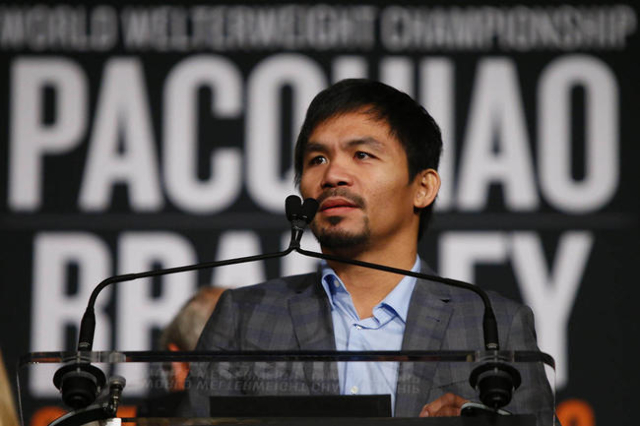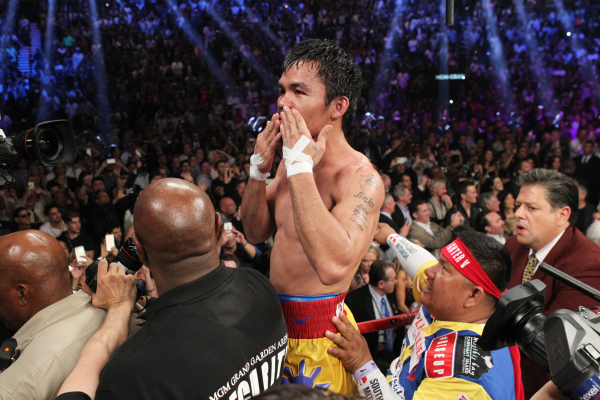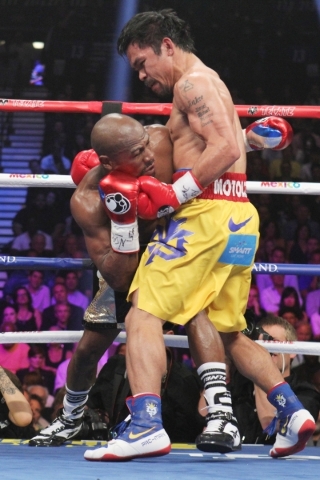Manny Pacquiao offers us another lesson
I suppose the correct response should liken that of throwing an errant pass to an open teammate in a weekend pickup basketball game: My bad.
Well, our bad.
We again have foolishly mixed athletic gifts with moral compass, shocked those we admire most for their physical skills in sports aren't also shining examples of virtue and acceptance.
This one, too, is on us.
Do you remember when Floyd Mayweather Jr. in 2010 launched an online racist tirade against Manny Pacquiao, a collection of anti-Asian stereotypes that lasted 10 minutes and painted Mayweather as a bigot?
The video clip also proved Mayweather a bit muddled on his cultural condemnation, given he compared a Filipino boxer with Japanese food.
Floyd was predictably confused, but his views were clear.
The reaction to Mayweather's hatred rant brought the usual heavy dose of disapproval toward the undefeated and soon-to-be-unretired-fighter — you don't really believe his career is finished, do you? — but in no way were many shocked at the words that flowed from his mouth.
Floyd is hardly a typically beloved athlete, and his abhorrent attack against Pacquiao was considered more par for the course than some shocking revelation about Mayweather's character.
But the moment came rushing back last week when Pacquiao offered his own moment of discriminatory thoughts, calling those in same-sex relationships "worse than animals."
Suddenly, Pacquiao became a whole lot more like Mayweather than we ever dreamed.
In the worst possible way.
I wish like anything Pacquiao hadn't apologized shortly after, an obvious ploy by his public relations team to limit damaging fallout to his image, which certainly failed given Nike — which seems to have a much bigger issue with athletes' religious views than those who sleep around on their wives — immediately dropped the fighter from its stable of athletes. Tiger Woods, of course, remains sponsored by the company.
No one really believed Pacquiao was sorry. It actually made the entire mess worse.
I wish he hadn't apologized, because a day later, Pacquiao posted a bible verse on his Instagram account that supported his anti-gay stance, and if you read Leviticus 20:13, it clearly states homosexuals should be killed.
Because these are the beliefs Pacquiao, set to fight Timothy Bradley on April 9 at the MGM Grand Garden, obviously supports.
Because this is who he is, a man who said he found God in the wake of admitting to extramarital affairs and engaging in other vices.
Nike, by the way, never had a problem with those.
We should remember for a minute the part about confronting ignorance with knowledge and bigotry with tolerance. It's not on others to judge a man's life.
But it is on us to question why our reverence of athletes extends beyond the playing fields, and why we continue to be so disappointed when they predictably let us down as flaws in their personality become apparent.
Some won't believe Pacquiao's stance is wrong at all, and that is their right.
But if you are in the camp that thinks his words were ignorant and uneducated and incredibly disheartening, pause to wonder why we are at all dismayed by them.
From a young age, the best athletes are treated as the cultural elite among us, and when their warts are exposed to the world, we have a devil of a time accepting those we have championed for so long aren't the heroes we imagined them to be.
So when the shine comes off a Pacquiao and Woods and Lance Armstrong and Peyton Manning and so many others, when the reality no longer can be disguised behind an athletic prowess owned by such a select group, when we finally accept those we cheer and admire for playing games are just as morally and ethically defective as the rest of us, the sense of dejection can be powerful.
The problem is, we truly believe we know these athletes, when the fact is we know nothing about them at all. Few stories have galvanized a fan base like that of Pacquiao — having fought himself out of severe poverty as a boy to become a champion of eight weight classes and a favorite to one day sit as president of the Philippines, having fed and clothed and housed so many of the poor throughout his country.
He is no normal superstar.
But he is also the latest example of those we shouldn't turn to for moral guidance, and a stark reminder of how misguided we are to assign athletes any status above what they might achieve in their sport.
It was seven months before their megafight in 2015, before of the most disappointing nights in boxing history given the action in no way matched the years of preceding hype, when Pacquiao spoke about Mayweather.
"I think I finally understand him ... what he says ... how he acts ... and I don't like it," Pacquiao said. "But what l learned and heard from him, well, I realize why he is like that. I understand sometimes when the people are not educated, they just talk to talk.
"He sets a very bad example."
A few years later, Pacquiao should look in the mirror and utter the same words.
And when we see his face, along with all the other athletes we cheer, remember this: No one really knows anyone.
Let's limit the hero worshiping to those who really deserve it.
Ed Graney can be reached at egraney@reviewjournal.com or 702-383-4618. He can be a heard on "Seat and Ed" on Fox Sports 1340 from 2 p.m. to 4 p.m. Monday through Friday. On Twitter: @edgraney



















